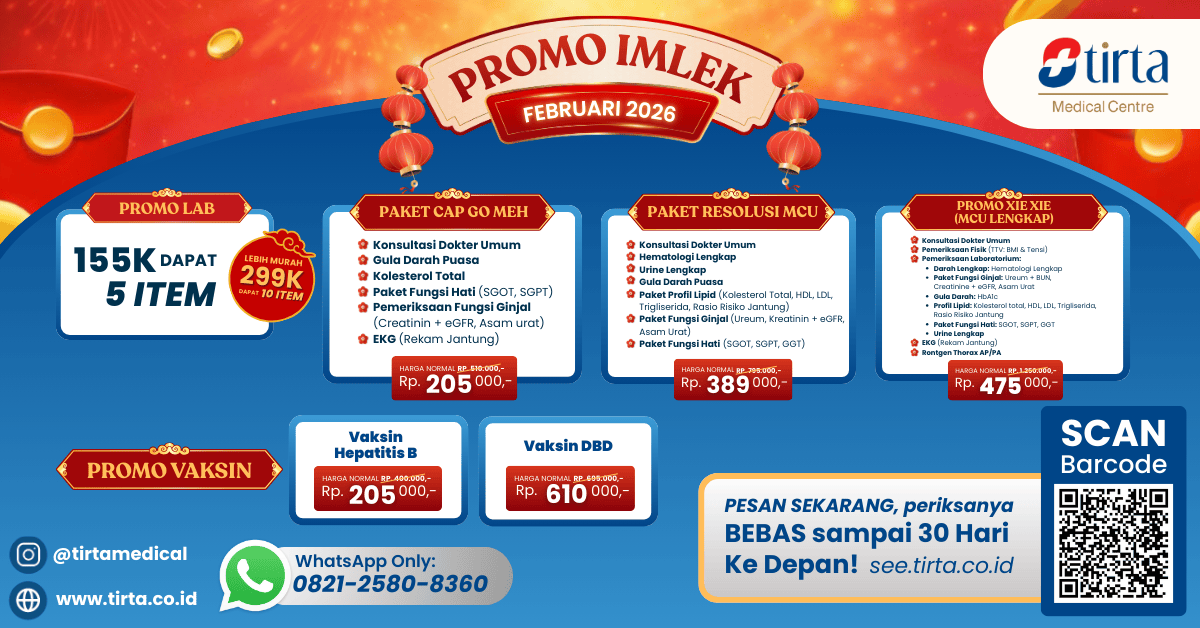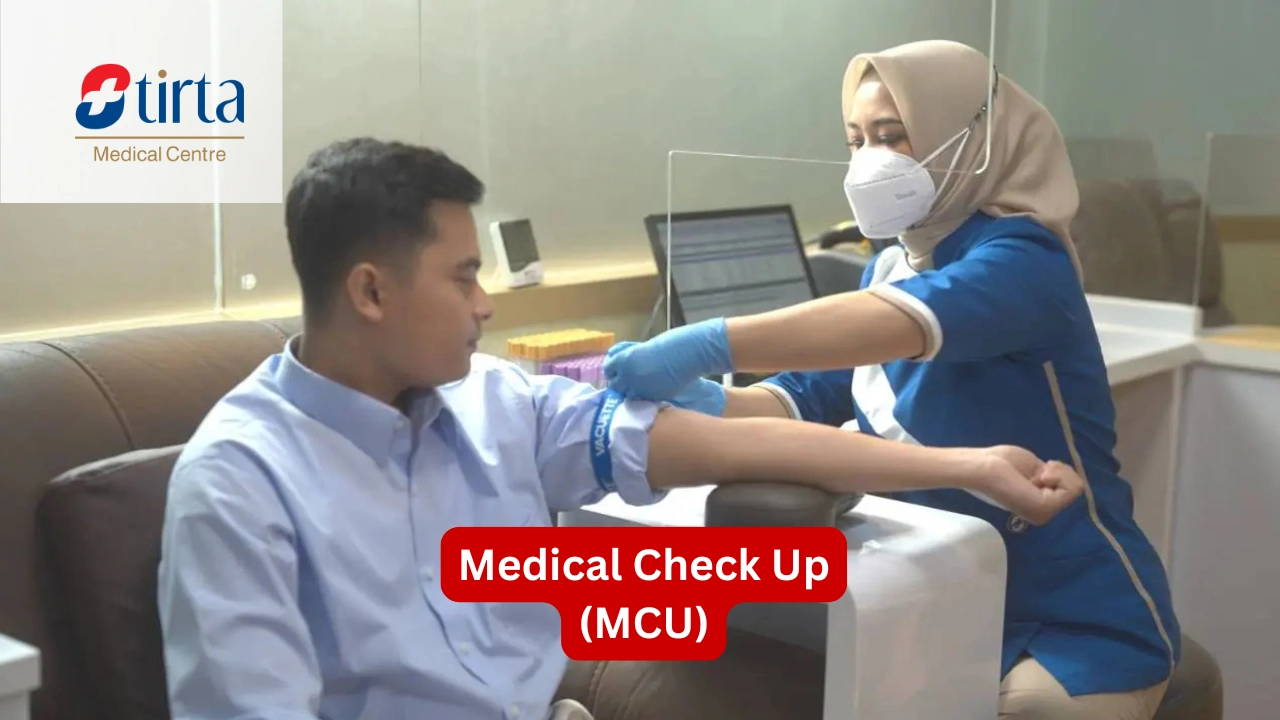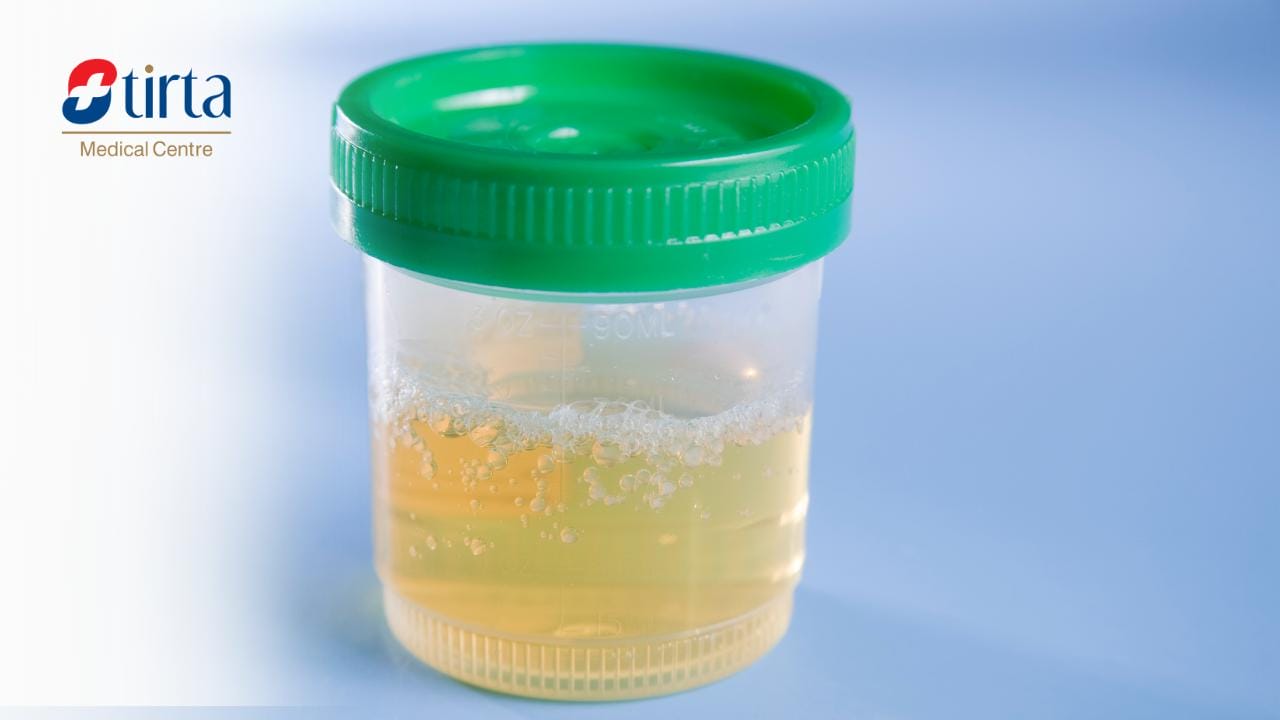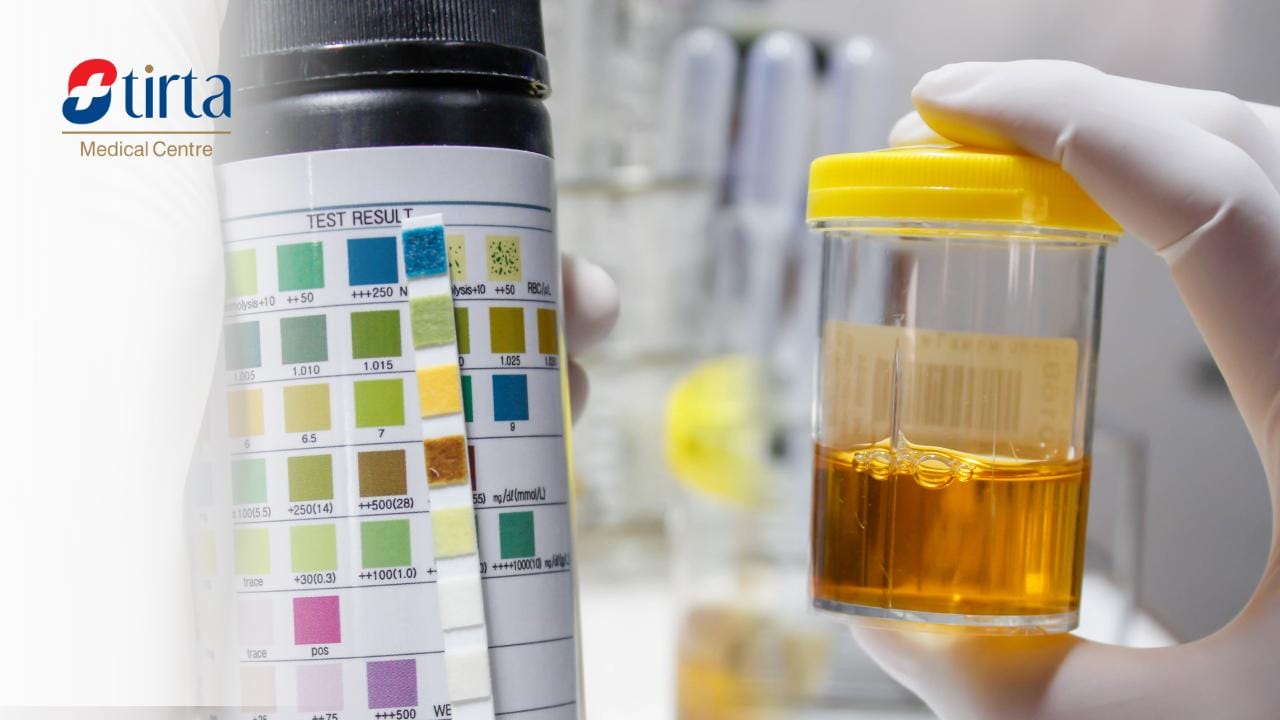A Medical Check Up (MCU) is a thorough health assessment focused on identifying diseases early on, without symptoms, to promote prevention through early detection and management of chronic conditions like diabetes, hypertension, and cancer.
Regular exams are important for people over 40 and those at risk of chronic diseases. These exams include blood tests, lipid profiles, and organ function tests tailored to individual needs.
Through an MCU, doctors can provide personalized recommendations about healthy lifestyle choices and necessary interventions to maintain optimal health. This not only assists individuals who show symptoms but is also extremely useful for those who appear healthy, as part of preventive health management.
Each MCU result is followed by a consultation to explain the findings, provide medical advice, and plan the next steps if needed, helping individuals stay active and productive while reducing long-term healthcare costs.
What is a Medical Check Up (MCU)?
A Medical Check Up (MCU) is a thorough health examination conducted to detect early signs of disease or abnormalities in the body before symptoms manifest.
The primary goal of an MCU is to maintain health and prevent disease progression through early detection and timely treatment.
Types of Examinations in an MCU
A comprehensive Medical Check Up is a thorough evaluation aimed at assessing an individual’s health condition. The types of examinations in an MCU include:
1. Physical Examination
The physical exam is the first step in an MCU, where a general practitioner will conduct a general assessment of the patient’s physical condition. This includes measuring height and weight, blood pressure, and examining other body organs for signs of disease.
2. Visual Assessment
This health test involves examining the condition of the eyes, skin, and other body areas that can provide indicators of a person’s health, such as skin color and eye clarity.
3. Radiology
A common radiological examination is the chest X-ray. This test is conducted to assess the condition of the lungs and other chest structures. Radiological images are interpreted by a radiologist to determine the presence of any abnormalities.
4. Laboratory Examinations:
- Complete Blood Count: Analyzes various components in the blood, including hemoglobin, white blood cells, and platelets.
- Complete Urine: Examines urine samples for indicators such as protein, glucose, and red blood cells.
- Lipid Profile: Checks total cholesterol, triglycerides, HDL, and LDL.
- Blood Glucose: Analyzes fasting blood sugar and HbA1c for diabetes diagnosis.
- Liver Function: Tests SGOT, SGPT, and GGT to assess liver health.
- Kidney Function: Tests urea, uric acid, and creatinine to evaluate kidney performance.
- Hematology: Includes various tests like blood type, complete blood count, and rhesus to evaluate the condition of blood cells and clotting factors.
- Hepatitis B and C: Blood tests to detect the presence of the hepatitis B and C viruses.
- Sexually Transmitted Diseases: Screening for diseases such as HIV, VDRL, and TPHA.
An MCU is an effective way to detect medical conditions at an early stage, before symptoms become more serious, and also as a preventive measure against chronic diseases.
Benefits and Objectives of the MCU for Health
A Medical Check-Up (MCU), or comprehensive health examination, has several important benefits and objectives. Here are some of them:
Benefits of the MCU
1. Early Disease Detection
Improved early disease detection for serious illnesses like cancer, diabetes, hypertension, and heart disease, increasing the likelihood of successful treatment.
2. Regular Health Monitoring
Through regular MCUs, small changes in health can be identified and monitored, helping individuals to more effectively track their health progress.
3. Enhanced Quality of Life
By having complete knowledge of their health condition, individuals can take proactive measures to prevent diseases or complications, thereby enhancing their quality of life.
4. Disease Prevention
The MCU provides crucial information that can be used to adopt a healthy lifestyle, such as a balanced diet, regular exercise, and stopping smoking or alcohol consumption.
5. Efficiency in Care
The MCU aids in planning and managing more efficient healthcare, identifying the most effective treatments based on actual health conditions.
Objectives of the MCU
1. Comprehensive Health Evaluation
Assesses health comprehensively through various tests and examinations including physical, laboratory, and imaging.
2. Risk Factor Identification
Identifies risk factors that may lead to diseases in the future, such as high cholesterol, high blood pressure, or unhealthy eating patterns.
3. Creation of a Personal Health Plan
Provides data to help doctors create a personal health plan suited to an individual’s health condition.
4. Provision of Baseline Data
Provides baseline information useful for comparing future health conditions.
5. Promotion of Health Awareness
Enhances individuals’ awareness of the importance of maintaining health and recognizing early signs of disease.
6. Maintenance of Optimal Health
Assists individuals in maintaining optimal health by providing specific recommendations based on MCU results.
Through an MCU, individuals can be more proactive in managing their health, ensuring that appropriate treatments and preventive actions are taken to maintain and improve the quality of life.
Medical Check-Up Package Prices at Tirta Medical Centre (TMC)
Tirta Medical Centre (TMC) offers various Medical Check-Up (MCU) prices tailored for different health needs across Indonesia. Here are some of Medical Check-Up packages available at all Tirta Medical branches along with their respective prices:
1. Basic Medical Check-Up Package: Rp435,000
- Physical examination by a General Practitioner
- Visual Assessment
- Radiology: Chest X-ray with Radiology Interpretation
- Laboratory Examination: Complete blood count, complete urine, lipid profile, fasting blood sugar, and liver function (SGOT, SGPT)
2. General Heart Check-Up Package: Rp1,195,000
Includes physical examination, visual assessment, chest X-ray, and more comprehensive laboratory tests including kidney function (Urea, Creatinine, Uric Acid) and complete lipid profile (Total Cholesterol, HDL, LDL, Triglycerides).
3. Diabetes MCU Package: Rp595,000
Focuses on examinations related to diabetes including HbA1c and kidney function.
4. Cholesterol MCU Package: Rp606,000
Specific examination for the lipid profile including total cholesterol, HDL, LDL, triglycerides.
5. Pre-Marital Women Prime MCU Package: Rp1,595,000
Comprehensive examination including Electrocardiography (EKG), Obstetric Ultrasound, and sexually transmitted disease tests.
6. Pre-Marital Basic MCU Package (Men/Women): Rp1,350,000
Comprehensive examination for men or women including EKG, sexually transmitted disease tests, and doctor consultation regarding medical results.
7. Genomic Test Package: Rp4,800,000
Genetic testing for disease risk evaluation based on genomic profile.
Preparation Before a Medical Check-Up
Before undergoing an MCU, it is important to make some preparations that can help ensure the accuracy of the test results. These preparations include:
1. Fasting
It is generally recommended to fast for 8-12 hours before the examination, especially if undergoing blood sugar and lipid profile tests. Only water is allowed during the fasting period.
2. Avoiding Alcohol and Caffeine
Avoid consuming alcohol, caffeine, and tobacco products at least 24 hours before the MCU to prevent their influence on some test results.
3. Medication Management
Inform the doctor or laboratory about all medications being taken, both prescription and over-the-counter, as some can affect test outcomes.
4. Comfortable Clothing
Wear comfortable and loose clothing, especially ones that can easily roll up sleeves or provide access for blood sample collection.
5. Medical Documents
Bring relevant medical records, including the latest vaccination history and previous health test results that may be relevant to the MCU.
Medical Check-Up Procedures
The procedure for a Medical Check-Up typically involves the following steps to ensure a thorough health evaluation:
1. Registration
Initial registration at the healthcare facility, followed by filling out a form that includes health history and current symptoms if any.
2. Vital Measurements
Measurements of weight, height, blood pressure, and possibly other vital parameters as part of the initial examination.
3. Sample Collection
Collection of blood and urine samples, which will then be analyzed for various health parameters such as kidney function, liver function, and blood sugar levels.
4. Comprehensive Physical Examination
Conducted by a doctor, includes examination of the cardiovascular system, respiratory system, abdomen, and other physical exams depending on the age and gender of the patient.
5. Additional Tests
Based on medical indications, additional tests such as ECG, chest X-ray, or ultrasound may be performed.
6. Review and Consultation of Results
After all test results are obtained, the patient will consult with a doctor to discuss findings and receive advice or a follow-up plan if necessary, including arrangements for follow-up visits or referrals to specialists if conditions requiring further care are identified.
Reasons for MCU Test Failures
Medical Check-Up tests can fail for various reasons that might not be immediately apparent to many people. Here are some common causes of failures in MCU tests, as outlined by reliable sources:
1. Undiagnosed Health Conditions
One of the main reasons for MCU failures is the presence of undiagnosed health conditions that emerge during the examination. Conditions such as hypertension, diabetes, or kidney disease can be detected during an MCU and if these parameters exceed normal limits, the MCU can be considered a failure.
2. Patient Preparation Errors
Patients who do not follow preparation instructions precisely, such as fasting or avoiding certain medications, can affect test results. For example, consuming food or beverages contrary to instructions can alter test results evaluating kidney function or blood sugar levels.
3. Technical Errors or Laboratory Mistakes
Errors in the laboratory process, such as mistakes in sample collection, handling, or analysis, can lead to inaccurate results. Equipment errors or the use of expired reagents can also be factors.
4. Medication Interactions
Medications taken by the patient can interact with test results. For instance, certain drugs can increase or decrease specific chemical levels in the blood that do not reflect the patient’s actual health condition.
5. Unexpected Body Responses
The body’s reaction to certain tests, such as stress or anxiety during testing, can also affect results. For example, blood pressure may temporarily rise due to stress, which could be misinterpreted as hypertension.
Medical Check-Up Costs in Indonesia
The cost of a Medical Check-Up in Indonesia varies depending on the type of examination and the facility chosen. For example, the cost for a basic package at Tirta Medical Centre starts from Rp 435,000 (Basic MCU Package), which includes basic physical examination, simple laboratory tests, and basic radiology such as chest X-rays.
For more comprehensive packages, the cost can reach up to Rp 4,800,000 (Genomic Test Package), which may include genetic testing and other specialized tests. Additionally, MCU services at larger and well-known facilities may be more expensive compared to Tirta Medical Centre.
Corporate MCU Services at Tirta Medical Centre
Tirta Medical Centre offers corporate MCU services designed to meet the health needs of corporations. Tirta Medical provides comprehensive health examinations for employees, including laboratory tests, physical examinations, and health consultations.
This service aims to assist companies in monitoring and improving the health of their employees, thereby increasing productivity and reducing workdays lost due to illness.
Tirta Medical Centre has partnered with various business sectors, including mining, banking, and hospitality, to provide optimal health services.
Duration of MCU Tests
The duration of an MCU can vary depending on the number and type of tests conducted. For a basic package, an MCU may take about 1-2 hours.
However, for more comprehensive packages, the process can take half a day or more, depending on the need for additional examinations such as MRI, CT scans, or other specialized tests.
After all tests are completed, additional time may be required for consultation with a doctor, who will explain the test results and provide further health advice.
By understanding the costs, services, and duration of an MCU, individuals and companies can better plan and utilize these services to proactively improve and maintain health.
Stages After a Medical Check-Up
After completing an MCU, there are several important stages to go through to maximize the benefits of the examination. Here are the common steps followed after an MCU:
1. Receiving the Report
Patients usually receive a report of the MCU results that includes all the tests performed. This report is often available in print or digital form a few days after the MCU is completed.
2. Doctor Consultation
After receiving the results, patients typically undergo a consultation with a doctor. At this stage, the doctor will explain the details of the test results, covering findings that are normal and those that require further attention.
3. Follow-up Plan
Based on the MCU results, the doctor may recommend follow-up actions. This could include additional tests for further investigation, treatment for identified conditions, or lifestyle changes to improve health.
4. Monitoring and Routine Care
For diagnosed conditions, the doctor will plan routine monitoring and necessary care. This may include medication, physical therapy, or consultation with other specialists.
5. Lifestyle Evaluation
An MCU often becomes a turning point for many people to reassess their lifestyle. The doctor can provide advice on nutrition, exercise, stress management, and quitting harmful habits like smoking and excessive alcohol consumption.
6. Regular Follow-ups
Depending on the MCU results and overall health condition, the doctor may recommend periodic MCUs, such as annually or every two years, to monitor changes in health and adjust care if necessary.
It’s important to understand that an MCU is not only about detecting health issues but also about preventing future health problems and improving overall quality of life.
Overall, the stages after an MCU are designed to ensure that you get the maximum benefit from the examination, receiving clear explanations about your health and a solid plan to improve or maintain it.
Questions Related to Medical Check-Ups
A Medical Check-Up typically includes a variety of examinations to assess overall health condition. Common tests include physical examinations (blood pressure, height, weight), blood laboratory tests (hemoglobin, white blood cells, platelets, electrolytes, blood sugar, cholesterol, liver and kidney functions), urinalysis, chest X-ray, ECG, and audiometry.
These examinations can be tailored to individual needs such as age, gender, and family health history.
The cost of a Medical Check-Up in Indonesia varies depending on the type of examination and the hospital or clinic providing the service. Generally, the cost of a Medical Check-Up ranges from Rp 400,000 to over Rp 2,000,000.
The cost of a Medical Check-Up for employment also varies, typically ranging from Rp 1,000,000 to Rp 2,000,000. This examination includes various basic tests such as blood tests, urine tests, chest X-ray, and ECG.
During a Medical Check-Up, various health aspects are examined. These include physical examinations, blood and urine laboratory tests, heart function tests with ECG, radiological examinations such as X-rays, and hearing tests.
Additionally, specific tests such as liver function tests, kidney function tests, and tumor marker tests may also be conducted.
To achieve good results during a Medical Check-Up, it is important to maintain a healthy lifestyle prior to the tests.
This includes getting adequate sleep, avoiding alcohol and caffeine, and fasting as instructed before blood tests. Additionally, following the doctor’s instructions and avoiding stress are also crucial.
The waiting time for Medical Check-Up results can vary depending on the type of examination performed and the healthcare facility used. Generally, results can be obtained within a few hours to several days after the tests are conducted.
A Medical Check-Up should be performed regularly, for example, once a year, especially for individuals with certain risk factors such as a family history of serious diseases.
For healthy adults, an examination can be conducted every 1-2 years. Early detection through a Medical Check-Up can help prevent serious diseases and maintain overall health.
References:
- Healthline. Physical Examination: https://www.healthline.com/health/physical-examination
- Reasons for Failing The Immigration Medical Exam: https://www.immediatemedicalcaremd.com/reasons-for-failing-the-immigration-medical-exam/
- Mayoclinic. Erectile dysfunction: https://www.mayoclinic.org/diseases-conditions/erectile-dysfunction/symptoms-causes/syc-20355776
- NIAMS. Bone Mineral Density Tests: What the Numbers Mean: https://www.niams.nih.gov/health-topics/bone-mineral-density-tests-what-numbers-mean
- WHO. Hypertension: https://www.who.int/news-room/fact-sheets/detail/hypertension







